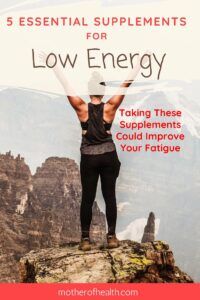If you feel like your energy is low, it may not be the everyday stress of the current world situation. It could be that you have a vitamin deficiency. Fatigue is one of the ways your body signals that something is lacking in your diet. Here we share some of the essential supplements for low energy because vitamin deficiency can have a long-term effect on your health.
Vitamins and Energy
Studies show that over 50% of people experience weakness and lethargy due to vitamin deficiency. If you notice you feel less energetic and enthusiastic and have difficulty keeping up with everyday activities, this could be you.
Of course, fatigue can also be a symptom of something more severe, like inflammation, infection, or the onset of a cold or flu. Or even more serious conditions like cancer, heart problems, or kidney problems, to mention a few.
But taking into consideration how common vitamin deficiency is, it's worth ruling out before freaking out about a potentially serious disease.
If you tend to rely on processed foods and quick meals to boost your energy, it doesn't work. Not all foods are equal, and processed food lack vitamins essential for boosting energy.
With some easy modifications to your diet, you can significantly improve your energy and state of mind.
In case you’re wondering which vitamins are people most commonly deficient in, here they are:
5 Essential Supplements for Low Energy
1. Vitamin D
Besides fatigue, people who lack vitamin D often experience other symptoms, like muscle and joint pain, as well as depression and aching bones.
Lack of energy often leads to depression and apathy. A deficiency of vitamin D leads not only to fatigue but can also lead to a range of different illnesses, from multiple sclerosis and diabetes to cancer and autoimmune disorders.
To bring back spring in your step, spend more time outdoors and stock up on vitamin D3 supplements.
2. Ashwagandha
An adaptogenic herb, ashwagandha has many health benefits. It is among the most important rejuvenating herbs in Ayurveda. It is also known as Winter Cherry and Indian Ginseng.
In Sanskrit, the name Ashwagandha means “the smell of a horse” implying that this herb gives the strength of a stallion.
Ashwagandha is commonly called the “ginseng of India” because it imparts overall energy to the system, with a marked calming effect.
Believed to increase energy, Ashwagandha has a beneficial influence on the nervous system. It is commonly prescribed for people who complain of fatigue, difficulty in concentrating, and a general feeling of nerve and muscle weakness.
3. Iron
One of the most common vitamins that people lack in their nutrition is iron. Iron is like the spark plug of your body. When you are deficient in iron, you are susceptible to a whole bunch of diseases. Iron deficiency, or otherwise known as anemia, means that there aren’t enough red blood cells in your body.
The first symptom people with anemia experience is a feeling of extreme tiredness, and if left untreated iron deficiency can lead to cardiovascular problems.
Fortunately, it’s easy to include iron-rich foods in your diet that will boost your energy and get you back on your feet.
Red meat, green leafy veggies, and dried fruits are guaranteed to improve iron levels in your body. And, if you want to make sure iron will be absorbed as efficiently as possible, consume vitamin C along with your iron-rich meals.
Orange juice, lemonade, or supplements will improve iron absorption and keep you energetic and lively.
4. Vitamin B Complex
8 different B vitamins:
B1 or Thiamin
Responsible for generating energy and mental clarity helps boost your immune system.
B2 or Riboflavin
- Increases oxygen usage in cells
- Acts as an antioxidant
- It Helps B6 synthesize in our bodies.
B3 or Niacin
Besides increasing your energy, B3 also helps with high cholesterol levels and the energy-draining consequences this has on the body.
B5 or Pantothenic Acid
Keeps your immune system in check and fuels energy.
B6 or Pyridoxine
Stimulates blood flow and ensures your circulatory system is functioning properly. Good circulation increases the level of oxygen in your blood cells, helping your body be full of energy.
B9 or Folic Acid
especially important during pregnancy, this vitamin helps the formation of red blood cells. Low levels of red blood cells can make you feel lifeless and lead to disease, so it’s crucial to include folic acid in your diet.
B12 or Cyanocobalamin
found only in animal products, this vitamin has a key role in converting nutrients to energy.
Without enough B vitamins in your body, you’ll feel lifeless and apathetic.
Include these foods rich in your diet
- Beef
- Turkey breast
- Eggs
- Tuna
- Wild salmon
- Oats
- Avocado
- Almonds.
5. Vitamin E
This vitamin acts as an antioxidant in our bodies, helping us to fight off the free radicals and boosting energy levels. Without enough vitamin E in your diet, the free radicals would take their toll on your energy and leave you feeling constantly tired and lethargic. Healthy levels of vitamin E in your body promote energy and help you feel more vibrant.
Foods that help you keep vitamin E levels in check are:
- Nuts
- Seeds
- Spinach
- Broccoli
Boosting Your Energy with Vitamins
There are many natural remedies for fatigue. But, the best way to obtain all the vitamins your body needs to stay healthy and energized is through a well-balanced healthy diet. Wholesome foods have all the necessary nutrients to keep you on the go and maintain your well-being.
If your diet consists of nutrient-rich foods in balanced ratios, chances are your needs for energizing vitamins are being fulfilled, and you won’t need to make any changes.
However, if your busy life leaves little room for cooking and planning meals, you may want to add these supplements to support your health.
The combination of these essential supplements for low energy will keep lethargy at bay. Don’t underestimate the effect of proper nutrition on your energy.



